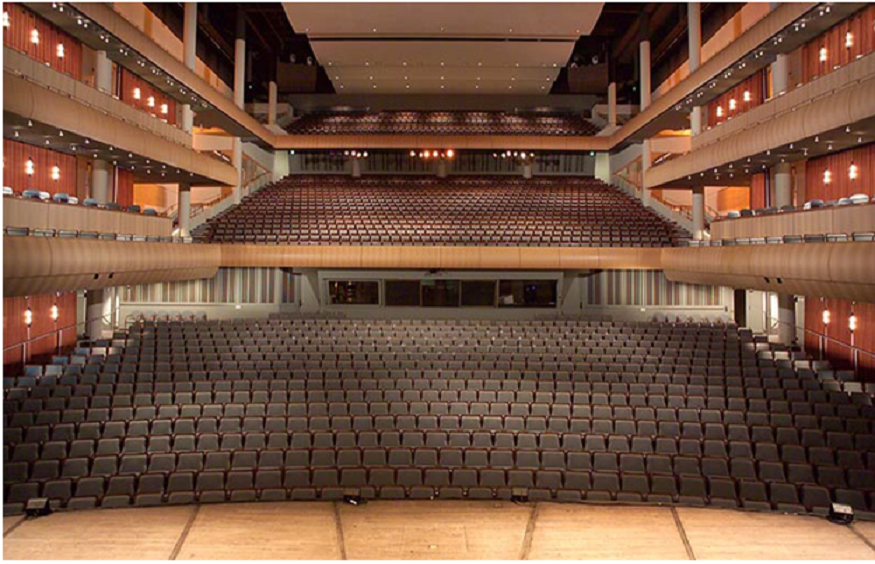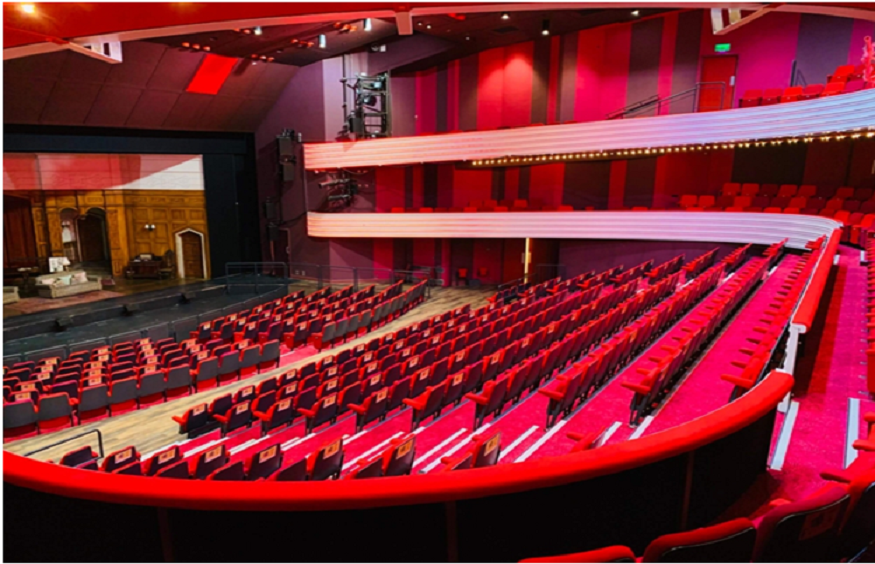The first impression of an amphitheater is often its seating arrangement. The layout of theater seats can vary remarkably, especially in larger venues with multiple aisles. To understand the most effective seating configurations, in the following article, let’s explore the types of theater architecture that influence the overall seating arrangements.
Types of Theater Venues: Characteristics and Features
The arrangement of amphitheater or movie theater seats depends on the types of the theater architecture and design. There are three main types of these places that we’re going to discuss here:
Proscenium Stage
The proscenium stage is the most common type of theater architecture. It features a raised stage area that is separated from the audience by a proscenium arch. The action on the stage takes place upstage from the proscenium arch.
This style of stage is particularly well-suited for staged plays and musicals, as it provides ample space for scenery and props. The wings on either side of the stage allow for a variety of entrances and exits, enhancing the dramatic possibilities.
However, the audience’s perspective is limited to one side of the stage, and the arrangement of the theater seats is typically in straight rows with aisles separating the seats into sections. This can sometimes limit the audience’s view and create a more traditional, formal atmosphere.
Theater in the Round
A theater in the round is another popular type of theater architecture. In this configuration, the stage is centered in the middle of the theater, and the theater seats of the audiences surround the stage on all sides. This arrangement creates a more intimate and immersive experience for the audience, as they are closer to the action and can feel more connected to the performers.
Still and all, staging can be more challenging in a theater in the round, as there are no wings to mask entrances and exits which requires careful planning and coordination to ensure a smooth flow of action.
Thrust Stage
A theater with a thrust stage combines the benefits of both the proscenium stage and the theater in the round. The stage extends into the audience area, creating a more intimate experience while still providing backstage access. The theater seats surround three sides of the stage, enhancing their connection to the action.
This type of stage offers a greater sense of intimacy and involvement for the audience, while also providing the performers with the advantages of a backstage area.
Types of Amphitheater Seating Arrangement
Here are a few effective movie theater seat arrangements commonly found in amphitheater venues:
Traditional Theater Seating Style
The straight row seating arrangement is a common layout in theaters and concert halls. In this configuration, the theater seats are arranged in parallel rows facing the stage or focal point. Aisles run vertically from the front to the back of the amphitheater, dividing the seating into sections.
The rows are arranged in a straight line facing the stage, allowing for a clear and unobstructed view of the performance. There may be one or more aisles running between sections of seats to facilitate easy access for audience members.
Semi-Circular Theater Seating
Curved seating arrangements in amphitheaters offer a distinct advantage in providing improved sightlines for the centrally located stage. The theater seats are arranged in a curved or semi-circular pattern, resembling a fan shape. More intimate atmosphere occur with this type of seating arrangement enabling the audience to enjoy a better view of the stage from various angles.
Continental Theater Seating
The continental seating layout arranges a large group of seats with aisles on two sides. Rows are typically limited to 49 chairs per aisle to ensure clear passageways and meet safety regulations. Yet, this layout has become less popular due to its potential for congestion and limited accessibility, especially in larger venues.

Multiple Aisle Seating Arrangement
Theater seats arrangement is also done according to the number if aisles. Multiple aisles running through the sections facilitate easy navigation for the audience, ensuring a comfortable and enjoyable experience. Some common multiple aisle seating arrangements are introduced here:
Cross-Aisle Layout:
The cross-aisle layout, with its intersecting main aisles, offers unparalleled accessibility to all sections of the venue. Each seating block is seamlessly connected to one of the main aisles, ensuring effortless entry and exit for the audience.
Radial Seating Arrangement:
This movie theater seats arrangement characterized by a central stage surrounded by multiple radiating aisles, is a popular choice for large theaters or arenas that provides an exceptional viewing experience from various angles, as each aisle offers access to multiple seating sections, facilitating efficient entry and exit paths.
Grid Seating Arrangement:
Grid seating arrangement which divides the seating area into a grid-like pattern with multiple aisles running both horizontally and vertically, is a versatile option for larger venues with multiple sections or tiers. The grid theater seats arrangement ensure balanced access to all seating blocks, as aisles intersect at regular intervals, providing convenient entry and exit points for the audience.
Staggered Seating Arrangement:
The staggered configuration which arranges seating sections in a staggered pattern, is a space-efficient option that optimizes sightlines and seating capacity.
Conclusion
The choice of seating arrangement in an amphitheater or movie theater largely impacts the audience’s experience. Knowing the different types of theater architecture is a must for arranging the most appropriate theater seat layout. Factors such as sightlines, accessibility, and crowd management should be taken into consideration to set a space that results in comfort, enjoyment, and general satisfaction for attendees.




